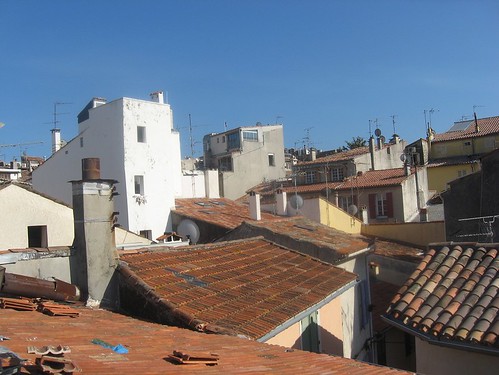The Franglais Culture of Antibes
The view from the Crewhouse balcony overlooked tiers of burnt orange rooftops, striking in contrast to the turquoise sky. Sun-washed adobe houses flanked the narrow stone roads and alleyways. I breathed in the salty air, feeling the daylight glint off my sunglasses.
I had come to Antibes alone, a city in the French Riviera that was refreshingly vacant of other American vacationers, despite its large English-speaking community.
Antibes is quieter and less urban than other major cities in the Cote d’Azur, especially in the Vieil Ville area that wraps around the coastline. And while its economy thrives on gelato stands, bikini shops, and yachting ports, it isn’t overcrowded by tourists.
My friend Anna from back home was doing an apprenticeship at a genuine French bakery in Antibes—the kind of place that in America could never survive among all the chain cupcake stores and fast food bagel joints. Never having been to France before, I couldn’t pass up the opportunity to visit. I booked a bed at The Crew Grapevine, a hostel-style accommodation where young people stayed while looking for work on yachts. It was a two-story house, tucked into a T-shaped corner of an alley where lush green ivy sprouted from stone walls.
There were about 16 others staying at the house, from the UK, Canada, South Africa, and Australia: a mélange of Anglophone accents. I slept in the first morning, fighting off jet lag, while my three roommates were up before dawn, the room buzzing with sounds of hair dryers and high heels, as they prepped themselves for a morning of dock walking.
Without Anna or my roommates on my first full day in France, I was on my own. I wandered through the farmer’s market, overwhelmed by the voices that rang out from every booth. I passed by the same coffee shop three times before hesitantly approaching its open window and ordering an espresso in quiet English.
More wandering lead me uphill to the Centre Ville, where white hotel towers and four-lane roads took the place of plazas and fountains. I stopped in a grocery store to stock up on the essentials.
Though I had brushed up on my French with Netflix Instant movies, instructional tapes, and gleefully perusing a book called Dirty French, it had all escaped me. I tried to fit in with the locals in the store, who looked chic and streamlined, pulling their carts along at a diagonal angle. But the handle of my cart refused to lock in place, and I was left tugging on it like a child’s wagon.
Checking out was another awkward endeavor, struggling to piece together the numbers of the price… Seize euro, quatre-vent dix-sept… sixteen Euros… four twenty ten seven… Ah! €16.97.
My groceries lay scattered at the end of the till as the scowling cashier began ringing up the next customer. I recalled a ten-minute culture lesson from one of my high school French classes, learning that in France, customers bag their own groceries. But I didn’t have a bag, and couldn’t remember the word for it. I waited for the cashier’s attention, as she cast me an annoyed glance, as if to ask “What are you still doing here?” I meekly pointed to the plastic bags, and she haughtily replied, “Dix centimes”.
But I wasn’t about to let one sour encounter fulfill the stereotype that French people were rude and snobby. As the afternoon wore on, I found that the Francophone residents of Antibes were friendlier than I expected. My hesitations dissipated as I became more familiar with the city.
I divided my days between beaches and museums. The Picasso Museum was the most memorable, the Absinthe Museum definitely the least. If there was time in the afternoon, I’d jaunt off to Nice, Cannes, or Monte Carlo, all of which were beautiful, but too hectic and glitzy.
Anna would meet me after work each evening, and we’d either join her coworkers or my roommates for drinks at The Hop Store (which, after hearing it pronounced in a French accent, I originally thought was called Lobster), or Le Blue Lady pub, one of the many establishments in the area named in ‘Franglais’.
The last evening of my trip, two of Anna’s work friends drove us around the curve of the bay to Juan-Les-Pins, where gourmet restaurants were set up on the beach. The cool sand on my feet and rosé in my glass felt indescribably luxurious. That night, I put off packing in favor of watching Star Wars, dunking croissants in Nutella, and drinking cheap wine with the rest of my housemates.
Ducking out just before midnight to replenish the Crewhouse’s dangerously low booze supply, I struck up a conversation with an old man who was headed in the same direction, his adorable Schnauzer leading the way. When the man asked me, “Vous êtes française?” I felt as though I’d passed the French litmus test. I passed for a native.
Growing up, I was a total homebody. I never understood the appeal of traveling, reasoning that because one would have little more than memories by the end of it, it was mostly a waste of money. But the next morning, taking one last look at the view from the balcony before I left Antibes, I was never so glad to prove myself wrong.
All images © Molly Schoen








